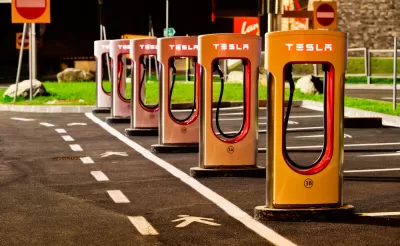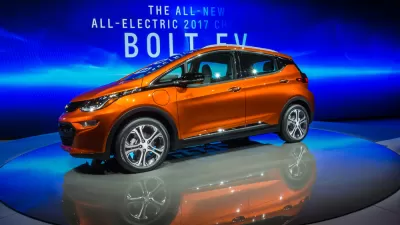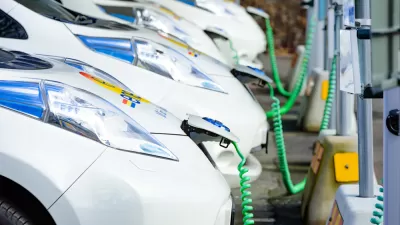Sometimes market-based systems don't work as intended. This appears to be the case with the California Air Resources Board's program of awarding credits to zero emission and near zero emission vehicles. Tesla's success is bad for the market.

Historically low gas prices may be the greatest barrier deterring more Californians from opting to purchase electric vehicles, but it is not the only one. It turns out that a market mechanism meant to force automakers to sell more zero emission vehicles is backfiring, and, to quote one environmental advocate, is in need of a 'tune-up'.
"California’s Zero Emission Vehicle program — which pushes automakers to sell an increasing number of electric cars, plug-in hybrids and fuel-cell vehicles in the state — has become a source of increasing concern to environmentalists, who say it risks falling short of Gov. Jerry Brown’s goal of having at least 1.5 million emissions-free vehicles on the streets by 2025," reports David R. Baker covers energy and clean tech for the San Francisco Chronicle.
Bakers explains the critical role played by Zero Emission Vehicle credits in the ZEV program, and how Tesla's "success could turn into one of several factors threatening the ZEV program."
The program gives automakers credits based on the number and types of clean cars they sell within the state. If a company sells more clean vehicles than it needs, it can sell its excess credits to other automakers that haven’t moved as many.
Tesla has benefited greatly from the program. In the first quarter of this year alone, it made $57 million from selling ZEV credits to other carmakers.
“One automaker, like Tesla, could generate so many credits that nobody else would have to do much of anything,” said Simon Mui, Director of Natural Resources Defense Council's California Vehicles and Fuels, Energy & Transportation program. “You could see Tesla very easily blowing the requirement out of the water.”
Tesla Motors was initially happy with the system that played a critical role in enabling his company to turn a profit for the first time in 2013, according to David Weinberg of Marketplace. But now CEO Elon Musk has "had enough," writes Baker.
So many excess credits are already available that Musk, in his recent call with analysts, complained they were now worth “pennies on the dollar.” Despite Tesla’s $57 million first-quarter haul, ZEV revenue in the second quarter was so low that the company didn’t bother to spell it out.
A legislative fix to the credit program, supported by Gov. Jerry Brown, was introduced by Assemblywoman Autumn R. Burke (D-Inglewood) on Tuesday. "But the bill was opposed by most automakers and quickly died," reported Baker on Friday. [See AB 1108].
Part of the problem is that "as electric car technology improves and the cars are able to go farther on a single charge, companies can comply with the ZEV requirement by selling fewer cars — something the regulators didn’t anticipate," writes Baker.
“It’s a classic example of technology outpacing regulation,” Mui said.
The role of credits in meeting ZEV requirements was also described last year in a post describing CARB Chair Mary Nichols' goal of reaching 100 percent clean vehicle sales by 2030.
Credits are given to sales of zero emission (all battery-electric and fuel cell electric) vehicles and near-zero emission plug-in hybrid electric vehicles.
Courtesy of CARB ZEV Program
No rebates
Currently purchasers of electric vehicles (EVs) will be disappointed to learn that rebates, $2,500 for a battery-only electric or $5,000 for a fuel-cell vehicle, is not available. "For Fiscal Year 2016-17, funding has not yet been appropriated for this program," states the California Clean Vehicle Rebate Project webpage.
FULL STORY: California’s electric car program may be running out of gas

Montreal Mall to Become 6,000 Housing Units
Place Versailles will be transformed into a mixed-use complex over the next 25 years.

Planetizen Federal Action Tracker
A weekly monitor of how Trump’s orders and actions are impacting planners and planning in America.

DARTSpace Platform Streamlines Dallas TOD Application Process
The Dallas transit agency hopes a shorter permitting timeline will boost transit-oriented development around rail stations.

Interactive Map Reveals America's “Shade Deserts”
Launched by UCLA and American Forests to combat heat-related deaths, the tool maps the shade infrastructure for over 360 U.S. cities.

Bicycles and Books — In Sacramento, Libraries Now Offer Both
Adult library card holders can check out e-bikes and e-trikes for up to one week.

Colorado Landfills Emit as Much Pollution as 1M Cars
Landfills are the third-largest source of methane pollution in Colorado, after agriculture and fossil fuel extraction.
Urban Design for Planners 1: Software Tools
This six-course series explores essential urban design concepts using open source software and equips planners with the tools they need to participate fully in the urban design process.
Planning for Universal Design
Learn the tools for implementing Universal Design in planning regulations.
City of Mt Shasta
City of Camden Redevelopment Agency
City of Astoria
Transportation Research & Education Center (TREC) at Portland State University
US High Speed Rail Association
City of Camden Redevelopment Agency
Municipality of Princeton (NJ)




























